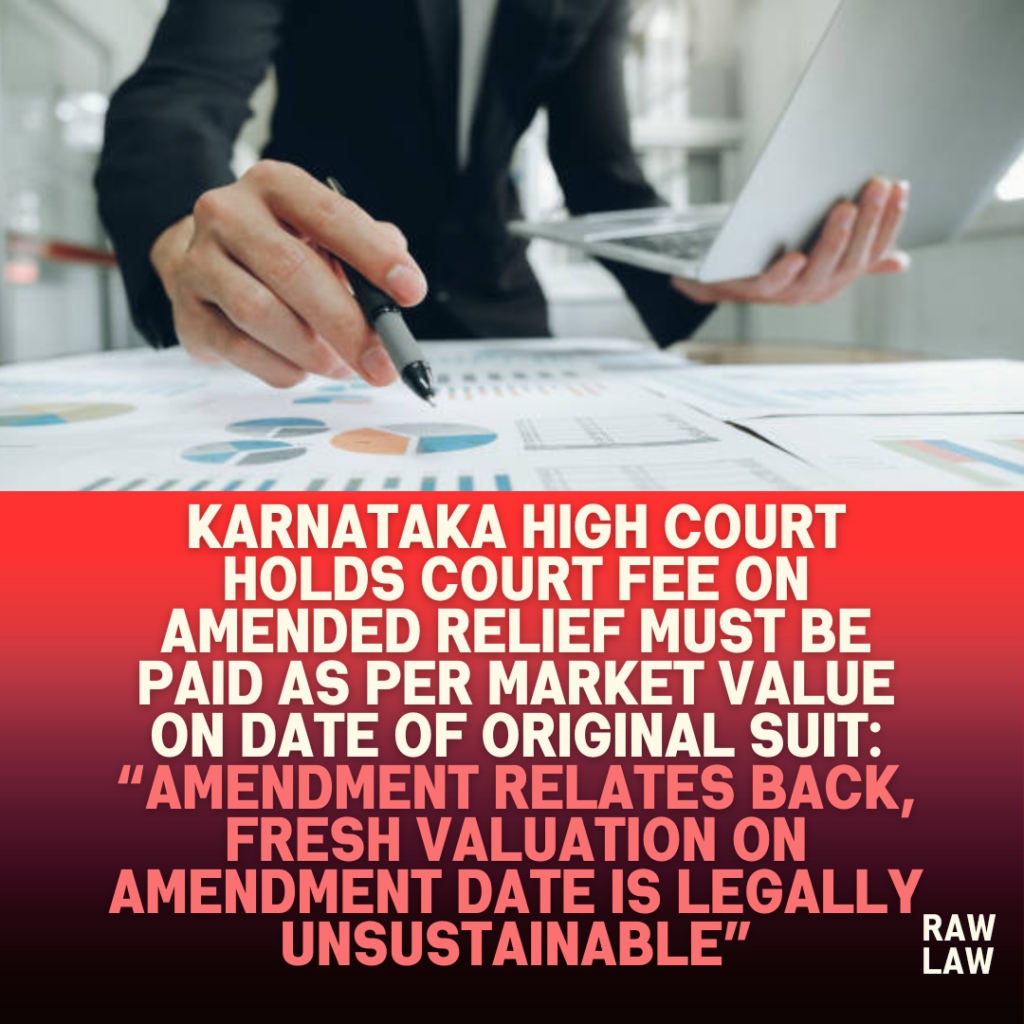Court’s Decision
The Karnataka High Court, in a judgment dated 2 June 2025, allowed the writ petition and quashed the Trial Court’s order that directed the plaintiff to value the amended relief of declaration and possession based on the market value of the suit property as of the date of the amendment application. The Court held that:
“An application for amendment of the plaint having been filed and said application having been allowed, the amendment relates back to the date of the suit… The reasoning of the Trial Court is ex-facie erroneous and is liable to be interfered with.”
The Court permitted the petitioners to file a valuation slip and pay the court fee based on the market value of the property as of the date of the original suit.
Facts
The plaintiff instituted a suit in 2005 seeking a declaration that a Sale Deed dated 28.03.1994 executed by one defendant in favour of another was null and void, and for an injunction restraining the alienation of the suit property. The suit was dismissed in 2009, but the High Court, remanded the matter for fresh adjudication in 2015.
Post-remand, the plaintiff filed an application under Order VI Rule 17 of the CPC to amend the plaint and include a declaration of absolute ownership and a prayer for possession. The Trial Court allowed the amendment on 06.11.2015. The plaintiff then submitted a valuation slip and court fee based on the value of the property as on the date of the original suit. However, the defendants objected, contending that the valuation should be based on the market value as on the date of the amendment. The Trial Court upheld this objection and directed fresh valuation and fee accordingly.
Issues
- Whether the amended relief must be valued as on the date of the original plaint or the date of the amendment application?
- Whether the Trial Court was justified in directing valuation based on the amendment date despite allowing the amendment without restricting its retrospective effect?
Petitioner’s Arguments
Counsel for the petitioners contended that once an amendment is permitted, it relates back to the date of the original plaint, unless expressly stated otherwise. Therefore, the court fee payable on the amended relief should be computed based on the value of the property as on the date of filing the original suit, not the amendment date.
Respondent’s Arguments
The respondents (though unrepresented in court) had filed a memo before the Trial Court asserting that the amendment introduced in 2015 warranted fresh valuation based on the market rate prevailing at that time, and not on the original suit date. This was the basis for the Trial Court’s impugned order.
Analysis of the Law
The Court relied on the established legal principle that amendments, when allowed, generally relate back to the date of the original plaint. This rule is not absolute, and courts have the discretion to specify otherwise. However, in the present case, there was no express directive by the Trial Court that the amendment should operate prospectively from the date of the amendment application.
The Court also referred to Section 7 of the Karnataka Court Fees and Suits Valuation Act, 1958, which mandates that the market value of the property for purposes of court fee is to be determined as on the date of the plaint.
Precedent Analysis
The Court relied on the Supreme Court’s decision in Sampath Kumar v. Ayyakannu & Anr., 2002 AIR SCW 3925, where the apex court held:
“An amendment once incorporated relates back to the date of the suit. However, the doctrine of relation back in the context of amendment of pleadings is not one of universal application and in appropriate cases the Court is competent… to direct that the amendment… shall not relate back…”
In this case, the High Court concluded that since there was no contrary directive, the amendment must relate back to the date of the suit.
Court’s Reasoning
The High Court found that:
- The Trial Court’s order ignored settled legal principles by assuming the amendment took effect from the date of application without any express order to that effect.
- The application for amendment was allowed without qualification, and thus, as per settled law, it related back to the date of the plaint.
- The direction to compute market value as on the amendment date was contrary to Section 7 of the Karnataka Court Fees Act and Supreme Court precedent.
Conclusion
The Court allowed the writ petition and set aside the Trial Court’s order dated 10.12.2015. The petitioners were permitted to file a fresh valuation slip and pay court fees based on the market value of the property as on the date of the original suit, within two weeks, if not already done.
Implications
This judgment reinforces the principle that amendments to plaints ordinarily relate back to the date of the original suit. The ruling ensures consistency in valuation and prevents arbitrary court fee enhancements arising from procedural amendments, unless explicitly directed by the Court.
Also Read: Gujarat High Court Quashes Detention Under PASA for Alleged Bootlegging
